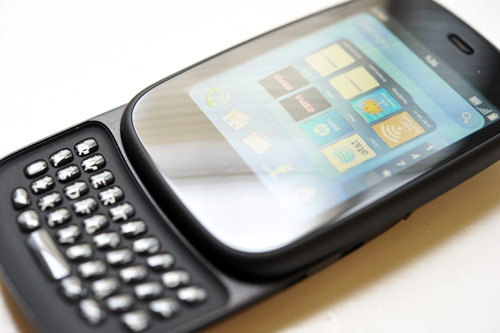HP Veer 4G Smartphone Preview
HP sells the Veer in both black and white. The black version seems the more classy of the two, as the black display beautifully bleeds over into the black chassis. The 2.6" display (400 x 320) is wildly small, particularly in comparison to the massive screens that are popping up on today's most cutting-edge smartphones. Above the display, there's the typical earpiece / speaker, while HP has included a unique "gesture area" beneath it. Those familiar with RIM's BlackBerry PlayBook bezel will understand this -- you can make gestures on the bezel to impact the display, without actually having to touch the display itself.
The left edge is home to a volume rocker, while the top has a full-size SIM card slot, a lanyard loop connector and a Mute / Unmute toggle switch. Coming around the top curve heading leftward, there's a power / sleep button, and on the left edge there's a magnetic charging port. The bottom is flush, while the rear has an HP logo, and AT&T logo, a speakerphone grille and a 5MP camera sensor.
Let's touch on that charging port while we're on the topic. While the Veer 4G is certainly thicker than the Galaxy S II (as an example), it's evidently not quite thick enough for HP to put a standard Micro-USB port on here, nor a 3.5mm headphone jack. These are two crucial design flaws. With this proprietary port, it means that you're stuck carrying around a special travel cable to charge it, and a special dongle if you need a 3.5mm headphone jack. Yes, TouchStone inductive charging is supported, but travelers aren't going to bust a TouchStone out in the airport. Having a Micro-USB connector would have been hugely appreciated; you can work around the headphone snafu with a pair of Bluetooth earbuds, but again, this is asking a lot out of the customer.
If you happen to forget, lose or misplace your special charging cable, there's no alternate way to recharge the phone. Moving on, a gentle push on the gesture area of the screen pops open a QWERTY keyboard. Those familiar with the Pixi and Pre will immediately recognize these keys. The keys are small, yes, but HP (or to a greater extent, Palm) has always had fantastic phone keyboards. That hasn't changed here. The key travel is excellent, though you'll have to get used to typing with fingernails in order to enhance accuracy and cut down on mashing multiple buttons at once. At the very least, this keyboard ensures that none of the valuable screen space is occupied with a virtual keyboard.
Once you slide up the keyboard, you'll notice that the rear functions as a mirror. A cute extra. The sliding mechanism is really top-shelf; it glides nicely, and requires the perfect amount of force to open and close. The display is extremely sharp and crisp, with amazing viewing angles. The only issue, however, is the physical size; it's just hard to read email on a smartphone with a 2.6" display now that we've grown used to the panels on the Droid X, iPhone 4, Nexus S, etc. The multi-touch support is also rock solid, and the gesture area never once let us down -- highly responsive from top to bottom.
The 5MP camera on the rear, unfortunately, was a let down. Images were consistently washed out and lifeless, and video was low quality. There's just no way you could use the Veer 4G's camera when it comes to taking serious images; in dimly lit environments, it goes from bad to really, really bad. The speaker and speakerphone, as well as the microphone, all seemed to live up to our expectations. Call quality was on par with other higher-end AT&T smartphones we have tested, and we could hear others loud and clear when we were able to lock onto a solid signal.










